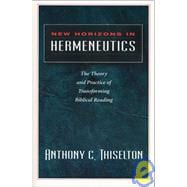
What is included with this book?
| Preface and Acknowledgements | xi | ||||
| INTRODUCTION: NEW HORIZONS | 1 | (30) | |||
| 1 Aims and Concerns | 1 | (3) | |||
| 2 Hermeneutics in the University, and the Bible and the Church | 4 | (4) | |||
| 3 New Horizons for Readers: Reading with Transforming Effects | 8 | (2) | |||
| 4 New Horizons in the Development of Hermeneutics | 10 | (6) | |||
| 5 The New Horizons of Fresh Argument and Transforming the Reading-Paradigm | 16 | (9) | |||
| Notes to Introduction [n. I-3I] | 25 | (6) | |||
|
31 | (24) | |||
|
31 | (4) | |||
|
35 | (7) | |||
|
42 | (5) | |||
|
47 | (5) | |||
|
52 | (3) | |||
|
55 | (25) | |||
|
55 | (3) | |||
|
58 | (5) | |||
|
63 | (5) | |||
|
68 | (7) | |||
|
75 | (5) | |||
|
80 | (62) | |||
|
80 | (4) | |||
|
84 | (8) | |||
|
92 | (2) | |||
|
94 | (9) | |||
|
103 | (11) | |||
|
114 | (11) | |||
|
125 | (7) | |||
|
132 | (10) | |||
|
142 | (37) | |||
|
142 | (6) | |||
|
148 | (9) | |||
|
157 | (6) | |||
|
163 | (4) | |||
|
167 | (6) | |||
|
173 | (6) | |||
|
179 | (25) | |||
|
179 | (7) | |||
|
186 | (4) | |||
|
190 | (4) | |||
|
194 | (4) | |||
|
198 | (6) | |||
|
204 | (33) | |||
|
204 | (5) | |||
|
209 | (7) | |||
|
216 | (5) | |||
|
221 | (7) | |||
|
228 | (5) | |||
|
233 | (4) | |||
|
237 | (35) | |||
|
237 | (5) | |||
|
242 | (5) | |||
|
247 | (6) | |||
|
253 | (8) | |||
|
261 | (6) | |||
|
267 | (5) | |||
|
272 | (41) | |||
|
272 | (7) | |||
|
279 | (4) | |||
|
283 | (8) | |||
|
291 | (7) | |||
|
298 | (9) | |||
|
307 | (6) | |||
|
313 | (31) | |||
|
313 | (9) | |||
|
322 | (9) | |||
|
331 | (7) | |||
|
338 | (6) | |||
|
344 | (35) | |||
|
344 | (7) | |||
|
351 | (7) | |||
|
358 | (10) | |||
|
368 | (5) | |||
|
373 | (6) | |||
|
379 | (32) | |||
|
379 | (6) | |||
|
385 | (8) | |||
|
393 | (12) | |||
|
405 | (6) | |||
|
411 | (60) | |||
|
411 | (8) | |||
|
419 | (8) | |||
|
427 | (3) | |||
|
430 | (9) | |||
|
439 | (13) | |||
|
452 | (11) | |||
|
463 | (8) | |||
|
471 | (45) | |||
|
471 | (8) | |||
|
479 | (7) | |||
|
486 | (9) | |||
|
495 | (4) | |||
|
499 | (9) | |||
|
508 | (8) | |||
|
516 | (42) | |||
|
516 | (8) | |||
|
524 | (5) | |||
|
529 | (5) | |||
|
534 | (6) | |||
|
540 | (6) | |||
|
546 | (4) | |||
|
550 | (8) | |||
|
558 | (39) | |||
|
558 | (5) | |||
|
563 | (3) | |||
|
566 | (9) | |||
|
575 | (7) | |||
|
582 | (10) | |||
|
592 | (5) | |||
|
597 | (24) | |||
|
597 | (7) | |||
|
604 | (7) | |||
|
611 | (8) | |||
|
619 | (2) | |||
| Bibliography | 621 | (41) | |||
| Index of authors | 662 | (11) | |||
| Index of subjects (including index to definition of terms) | 673 | (22) | |||
| Index of biblical references | 695 | (7) | |||
| Index of ancient extra-biblical sources | 702 |
The New copy of this book will include any supplemental materials advertised. Please check the title of the book to determine if it should include any access cards, study guides, lab manuals, CDs, etc.
The Used, Rental and eBook copies of this book are not guaranteed to include any supplemental materials. Typically, only the book itself is included. This is true even if the title states it includes any access cards, study guides, lab manuals, CDs, etc.